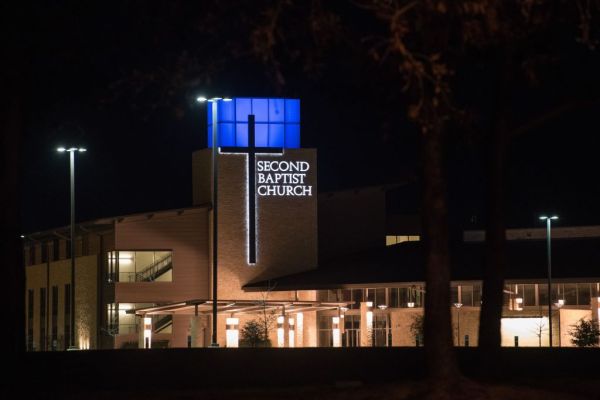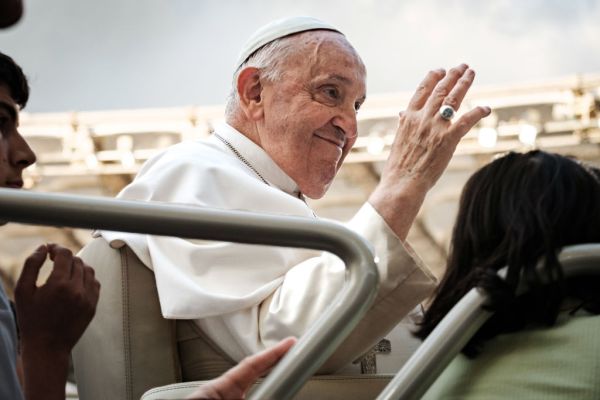Happy Sunday! Welcome to Dispatch Faith, our new newsletter that will focus on—shocker—religion and faith.
Why Launch Dispatch Faith?
Leave it to a Brit visiting more than a century ago to understand more about the United States than many Americans do today.
After traveling to America in 1921, author G.K Chesterton recorded his impressions in What I Saw in America, in which he described the U.S. as having “the soul of a church” and as being “the only nation in the world that is founded on a creed.” Historian Robert Tracy McKenzie distilled Chesteron’s point in his 2021 book We the Fallen People: “As a nation of immigrants, they believed that the essence of what it means to be an American had less to do with birth than with belief.”
Chesterton was referring more to a civil religion than he was metaphysics; more to America’s founding ideals than he was the predominant strain of Christianity at the time.
But it was impossible to “get” America in 1921 without “getting” religion—at least in a rudimentary way—and the same holds true today. Sadly, some of the most influential publications in the country seem to “get” religion less and less, as Dispatch CEO Steve Hayes recently pointed out.
Our hope is that this newsletter will—like my friend Terry Mattingly’s Get Religion website did for 20 years—serve as a corrective to that trend.
Those of you reading this in your inbox used to receive The French Press by David French. When David departed for the New York Times last year, Steve and Jonah wrote that we wouldn’t try to replace David’s incisive commentary—because we couldn’t. There’s only one David French. But we’ve featured regular reporting and essays in recent months from a growing stable of writers, each of whom brings a unique perspective to many of the same issues David would often write about.
These religion pieces have sought to continue doing what The Dispatch does best: add context and explanation to fraught (and often overwrought) issues, shine a spotlight on overlooked or misunderstood topics, and highlight sharp analysis from leading thinkers and honest brokers. We’ve published explainers on the split in the United Methodist Church, a Muslim thinker’s examination of famed atheist Richard Dawkins’ changing rhetoric on religion, a poignant personal essay on growing up Catholic in a largely Jewish neighborhood on Long Island, thoughtful criticism of the “trad wives” movement and its detractors, growing tensions in India between Hindus and religious minorities, and a whole lot more.
With each piece we’ve commissioned, our goal has been the same: to help readers understand the myriad ways religion intersects with the public square and, when warranted, to critique the bad actors exploiting religion for their own gain.
Dispatch Faith will not be a newsletter version of those “Coexist” bumper stickers you sometimes see on the road. We don’t intend to flatten out the real and substantive differences between religions. This newsletter also won’t cater to only one branch of one faith or seek to drive away those who profess no religious faith.
No, we want Dispatch Faith to help readers of all sorts better understand both religion in general and the nuances of particular faith traditions. Often, these essays will touch on religion’s influence on politics, policy, and culture writ large. But we hope this newsletter will be something different from the obligatory “gotta catch up on the news” reading we all do, going deeper than the Sturm und Drang of daily headlines.
Dispatch Faith will follow a mostly familiar format. Every Sunday morning, you’ll get a thoughtful essay from a top-notch writer and some analysis of ongoing debates and developments in the news. Before we send you on your way, we’ll highlight a positive example or two of religion in the public square.
I’ve spent most of my two-and-a-half years at The Dispatch working with reporters and writers behind the scenes as an editor. But with a background in both traditional media and Christian media and as an officer in my local church (a Presbyterian Church in America congregation), I’m excited to be curating each week’s edition of Dispatch Faith for you. As I wrote when I got here, I believe strongly in the importance of faith-based institutions in a pluralistic, free society like ours.
If you like what you read, please share it with family or friends, and don’t hesitate to send us your feedback in the comments or by replying to this email.
But that’s enough from me. Let’s dive into this week’s essay, from author and professor Karen Swallow Prior, who’s been no stranger to controversy in recent years, diving into some of evangelicalism’s thorniest debates. She’s criticized the hypocrisy of Jerry Falwell Jr., the scandal-plagued former president of Liberty University; taken issue with the Southern Baptist Convention’s work (or, perhaps, lack thereof) to root out abuse from its churches; and remained a staunch pro-life voice with both her writing and street-level action.
Drawing on her work as a literature scholar, today she examines how classic texts can help us see the problems inherent in movements like Christian nationalism. The movement itself has garnered lots of attention in recent years, as Karen notes. But the questions it poses—and the answers to those questions—are anything but new.
Karen Swallow Prior: Christian Nationalism Is a Failure of Imagination

There’s a lot to be said in opposition to Christian nationalism. Indeed, much has been said and written. Indeed, the very definition of Christian nationalism is contested, even among those who openly embrace it.
In Taking America Back for God: Christian Nationalism in the United States, Andrew L. Whitehead and Samuel L. Perry define Christian nationalism broadly as “a cultural framework—a collection of myths, traditions, symbols, narratives, and value systems—that idealizes and advocates a fusion of Christianity with American civic life.” As played out in the current American context, Whitehead and Perry show, Christian nationalism “is as ethnic and political as it is religious,” and assumes a “divine sanction for authoritarian control and militarism.”
A key element of Christian nationalism in Perry and Whitehead’s definition is that it “idealizes.” Idealization—of the imagined past and imagined futures, but especially the past—is a general human tendency. But the core of any “-ism” or movement is, of course, its ideals. And it is easy for ideals to become unmoored, first from reality, then from our very humanity.
History is rife with such examples, and ample critiques of Christian nationalist arguments convincingly show that its leading voices read history selectively at best. Not being a historian myself, I will leave the historical analysis to those experts.
But I can speak to another aspect to the trending and increasingly vocal brand of Christian nationalism: the impoverishment of imagination, a lack rooted in unreality and fantasy.
The painter whom Steve Bannon has called “the artist of the MAGA movement,” for example, has churned out countless paintings that, his website states, “tap into the heart of American Patriotism.” These and similar images have spread virally across the internet, spawning endless memes and AI imitations. This sort of saccharine art that fills the imaginations of Christian nationalists makes Thomas Kinkade look edgy and similarly malforms imaginations: pale-skinned families with rosy cheeks worshipping from wooden pews, Jesus hovering next to Donald Trump, and medieval knights and cathedrals displaying nary a chink in armor or stone from time or wear.
These latter images appear in a recently published Christian nationalist fever dream of a futuristic fantasy (set all the way in 2032!) about a no-longer-united United States ruled by a Christian Prince, a confederacy (naturally) finally rid of liberals and unbelievers by force of law and peopled by women relegated entirely to the home and prohibited from all public service. The tale is, the author notes, a work of fiction (just in case anyone was wondering). It’s written in the sort of prose that would shame a college freshman in a peer-review session:
Chapels and cathedrals, which formerly belonged to the Enemy, have been duly confiscated and returned to the orthodox; and, by order of the Prince, new chapel and cathedral constructions are taking place, both in metro and rural areas throughout the Confederacy, in consultation with the finest Christian architects and city planners. Civil renewal is well underway.
This is just one entry in an entire genre of Christian nationalist fantasy literature. Such art is to political theory and religious faith what romance novels are to real life and real relationships.
Fortunately, some of the most brilliant minds in history have already imagined more realistically what the tenets of Christian nationalism (even when called by other names) might look like. A brief glance at even a few of these great works shows how the questions raised by Christian nationalism, questions around national identity, race, and religious liberty, can be addressed with foresight, originality, and creative genius—as opposed to the pastiches of the past that mere nostalgia and the plagiarism of AI offer.
One of the most challenging works that wrestles with these questions is Jonathan Swift’s Gulliver’s Travels. Swift, a devoted Anglican priest of the 18th century, understood the dangers of nationalism, racism, and xenophobia. Even as a loyal defender of the established church, serving as dean of St. Patrick’s Cathedral in Catholic Ireland’s capital of Dublin, Swift was beloved by the Irish for championing their human dignity and freedom from oppression.
In the final voyage of the Travels, Gulliver, the naive narrator, finds himself amid a race of noble, rational horse-like beings called Houyhnhnms, who rule over another race of goatlike barbarians called Yahoos. The horses believe that Gulliver is also a Yahoo, and Gulliver has increasing difficulty denying their assessment of him, despite his fiercest wishes otherwise. The seemingly benevolent horses tolerate Gulliver for a while, teaching him their language and ways, but eventually decide that because they plan to exterminate the entire race of “odious” Yahoos, he must leave or share their fate. The gentle, reasonable rulers turn out to be violent fascists after all.
In an essay on Gulliver’s Travels, George Orwell points out that this seeming utopia—governed by pure reason, overt racism (the Houyhnhnms marry based on color of their coats), and consensus rather than rule of law—is in fact a form of government that is totalizing. To be clear, nationalism (Christian or otherwise) is not necessarily totalitarian or totalizing. The concept is anachronistic in the context of Swift, and Orwell’s concerns were not the same as those of today’s Christian nationalists. Nevertheless, both Swift and Orwell help us see how what can at first allure and comfort can ultimately turn vicious to both those in power and their subjects. For the race of overly rational horse-like people, Orwell observes, are in fact “exempt from love, friendship, curiosity, fear, sorrow and – except in their feelings towards the Yahoos, who occupy rather the same place in their community as the Jews in Nazi Germany – anger and hatred.”
While Orwell makes the common error of mistaking the perspective of Swift’s character for Swift’s own view, the essay, published in 1946, laid the groundwork for Orwell’s masterpiece, published just three years later, 1984. As anyone passingly familiar with 1984 knows, the story features a totalitarian dystopia ruled by an anonymous entity known only as Big Brother. The thoughts and imaginations of the citizens are narrowed by shrinking the language as Big Brother makes many words (and thoughts) illegal. Religion is illegal, too, and Winston Smith, the protagonist, is interrogated by the government merely for letting the word “God” slip into printed material from which such words were supposed to be excised.
“Aha!” the Christian nationalist might say. “Rather than outlawing religious faith, we would make atheism illegal!”
But, alas, compulsory Christianity is no better than compulsory atheism.
Moving further back in history to the time when the modern notions of religious toleration and liberty were first emerging, we should consider the life of John Bunyan, most famous for his enduring classic of the Christian faith, The Pilgrim’s Progress. A Dissenting minister during a time when preaching outside the authority of the established Church of England was illegal, Bunyan was arrested for doing just that. He was imprisoned for 12 years (then jailed again for several months for another religious crime). We can look to John Bunyan (and many of his Christian brothers and sisters) to see what the lack of separation of church and state looks like in real life. Bunyan’s imaginative works were fueled by the fire of real persecution—not fantasies about idealized Christian princes. Indeed, it is owing to his life and legacy—along with many others like him—that America came over time to codify religious liberty.
Another 17th century Puritan offers explicit arguments, not only for religious liberty, but for freedom of the press, free speech, and the freedom to be wrong—even to the point of heresy.
In 1644, John Milton, most famous for the Christian epic poem, Paradise Lost, published a treatise directed at his own political and religious faction, the Puritan-led Parliament, appealing to it not to resort to the licensing restrictions of the printing press that had been the approach of his faction’s enemy, the monarchy. Areopagitica (whose title is linked to the same Areopagus, or Mars Hill, made famous by the Apostle Paul in Acts 17) makes some of the most compelling arguments in modern literature for religious liberty. The work became a cornerstone for the First Amendment to the U.S. Constitution.
Milton’s arguments are thoroughly rooted, not only in robust Christian doctrine, but in firsthand knowledge of just how corruptible a marriage between religion and government is.
Virtue, Milton argues, differs from innocence, which does no wrong because wrong is not an option. Virtue must be chosen in order to be virtue:
He that can apprehend and consider vice with all her baits and seeming pleasures, and yet abstain, and yet distinguish, and yet prefer that which is truly better, he is the true wayfaring Christian. I cannot praise a fugitive and cloistered virtue, unexercised & unbreathed, that never sallies out and sees her adversary, but slinks out of the race, where that immortal garland is to be run for, not without dust and heat.
Liberty, not the coercion of the law, is the friend of truth, Milton writes. Licensing and prohibiting are its enemies:
And though all the winds of doctrine were let loose to play upon the earth, so Truth be in the field, we do injuriously, by licensing and prohibiting to misdoubt her strength. Let her and Falsehood grapple; who ever knew Truth put to the worse, in a free and open encounter. Her confuting is the best and surest suppressing.
Living and writing during the height of the English civil wars, wars fought between factions whose religious and political identities were indistinguishable, Milton fought for the right to be wrong (and free to be wrong), even on matters of utmost political, spiritual, and eternal importance:
Truth is compared in Scripture to a streaming fountain; if her waters flow not in a perpetual progression, they sicken into a muddy pool of conformity and tradition. A man may be a heretic in the truth; and if he believe things only because his Pastor says so, or the Assembly so determines, without knowing other reason, though his belief be true, yet the very truth he holds, becomes his heresy.
A flourishing Christian faith, along with a flourishing nation, depends on minds free and well-formed enough to recognize truth amid falsehood. The primary question Christian nationalism claims to ask—namely, what does it look like for people of faith (Christian or otherwise) to advocate in the public square for the public policies they believe will do the most public good?—cannot be answered with tropes, types, and cliches. Such are the makings of a flattened imagination that can deal only with ideas, not the real world.
Fortunately, great works of the human imagination that can cultivate imaginations capable of wrestling with the complexities of such questions are there—in abundance—to taste and see.
Another Sunday Read
Always driven by her professional dreams, Christianity Today reporter Sophia Lee never thought she’d trade a full-time career for full-time motherhood. But pregnant with her second child, she’s putting down her reporter’s notebook indefinitely. In the age of stereotypical tropes about feminism and “trad wives,” she does so clear-eyed about everything she’s giving up—and everything she’s gaining. “Neither side speaks to me. And these aren’t the kind of conversations I have with other women who struggle to feel fulfilled in motherhood or career,” Lee writes for Christianity Today. “Yes, I suppose I am that ‘typical modern woman.’ But there’s something more. Those delicious hours I spent as a child filling notebooks with ideas and stories were not feminist roars but an innate expression of a creative God, who blessed both men and women to create and cultivate. I didn’t go to work excited about toppling patriarchy or earning wealth or social status. I worked because I loved it. But then that changed. Our son, growing in my womb for months before I finally noticed him, started kicking. And before I ever felt ready to be a mother, two years ago, he was born with an indignant cry.”
A Good Word
The baseball world lost whom many regarded as the sport’s greatest living player—if not the greatest player ever—when Willie Mays died on Tuesday at the age of 93. Born in Jim Crow Alabama and rising through the Negro Leagues, by 1963 Mays was a superstar for the San Francisco Giants who had signed a record contract. But he was also plunging toward bankruptcy.
Louis Keene at The Forward has the story on how Mays was connected with an unlikely friend: a pioneering Jewish banker, Jacob Shemano, who saved Mays’ finances and welcomed him into a new community. Here’s a bit, as told by Shemano’s son, Gary:
The relationship ultimately ingratiated Mays with the Jewish community. Shemano once took Mays on a visit to the local Jewish Home, Gary said, and Mays later made visiting there a habit.
He appeared at Jewish community events so often that Mays was eventually invited into the local Concordia-Argonaut Club—a Jewish social club—as the first Black member, according to James Hirsch, author of the biography Willie Mays: The Life, The Legend.
And while Mays frequented the Shemano home on holidays, there was one Jewish delicacy he couldn’t handle.
“He loved my mother until she made him eat some smoked salmon on a bagel for Thanksgiving and he couldn’t swallow it,” Gary said. “It was hysterical.”
Read the whole thing here.
Let Us Know
What topics do you want to see this newsletter cover? Would you like to see a more focused breakdown of weekly religion news, or something more removed from daily headlines in this space?







Please note that we at The Dispatch hold ourselves, our work, and our commenters to a higher standard than other places on the internet. We welcome comments that foster genuine debate or discussion—including comments critical of us or our work—but responses that include ad hominem attacks on fellow Dispatch members or are intended to stoke fear and anger may be moderated.
With your membership, you only have the ability to comment on The Morning Dispatch articles. Consider upgrading to join the conversation everywhere.